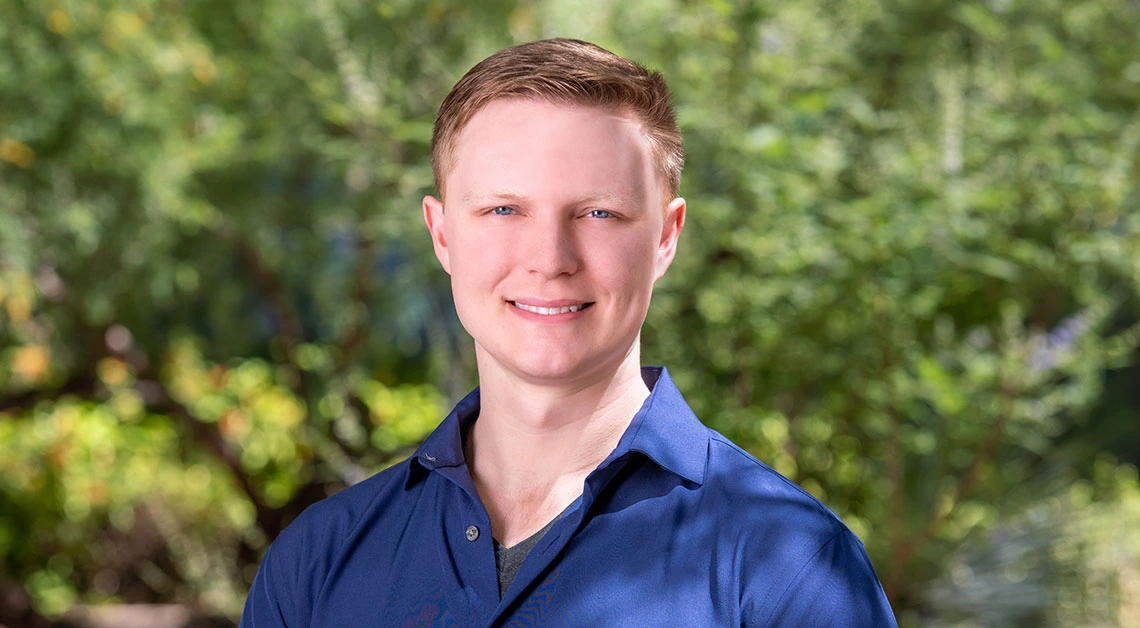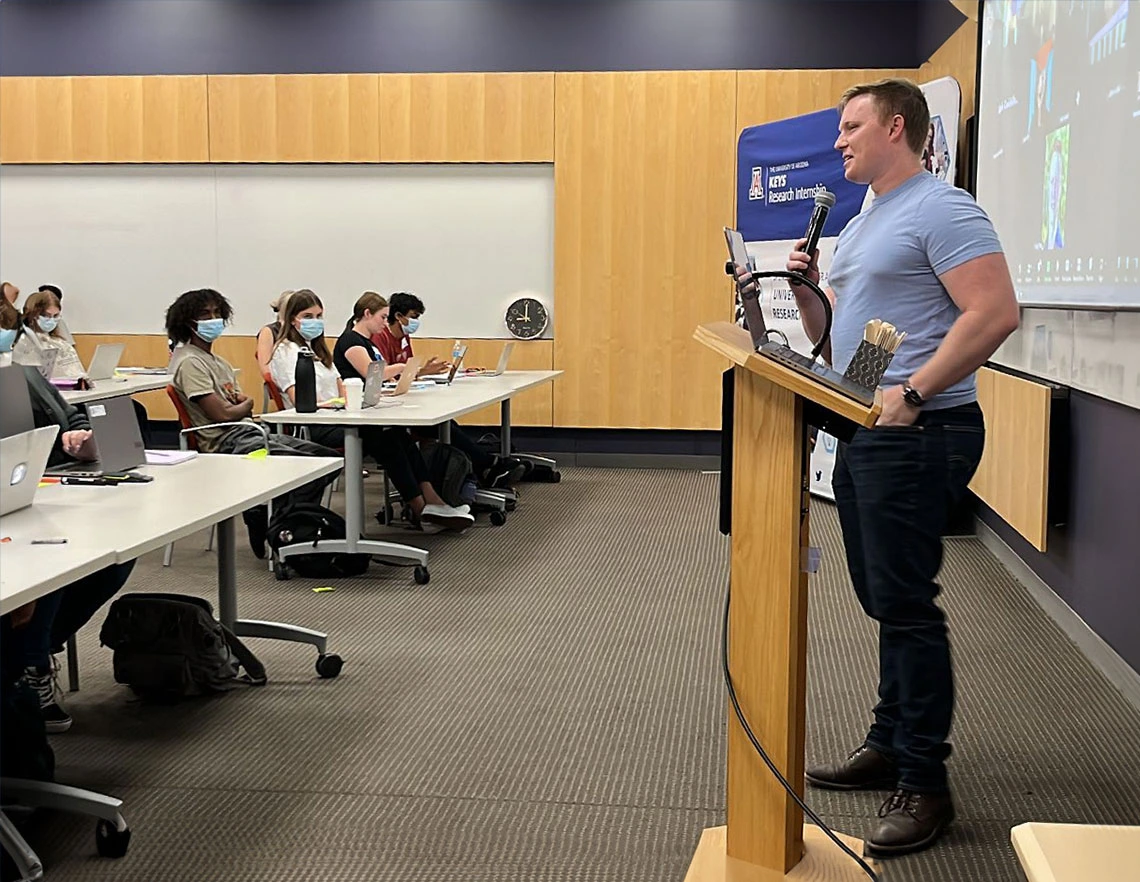Ensuring Creative Freedom: 8 Questions with Greg Chism, Assistant Professor of Practice
INFOSCI FACULTY PROFILE

Greg Chism, Assistant Professor of Practice.
Allowing my students to have creative freedom through their group projects promotes a strong sense of ownership in their own education. It is this experiential learning that seems to pay back the most for me, as well, because my students come up with problems and solutions that I would not have come up with myself.
Assistant Professor of Practice Dr. Greg Chism joined the College of Information Science in 2023 after earning his PhD in Entomology and Insect Science from the University of Arizona in 2022. His areas of focus in teaching include data visualization, statistics and statistical learning, and social network analysis, and his advice to College of Information Science students is straightforward: Reach out to your professors if you need assistance—something he ensures his students have the opportunity to do in his courses by providing “lab” time.
What brought you to the College of Information Science?
I joined the college because I was motivated by the diverse faculty, great culture and strong leadership. Previously, I was at the University of Arizona Data Science Institute (DSI) as a computational and data science educator, where I developed statistics and data science curriculum for a diverse learning population. I also performed data science-related tasks, such as investigating the impact of DSI’s education efforts.
What are you teaching, and what do you most enjoy about teaching?
This and next semester, I am teaching INFO 526: Data Analysis and Visualization and INFO 523: Data Mining and Discovery, as well as the new Capstone course (INFO 698), which will be focused on career development. I enjoy basically everything about teaching except grading…. I love the challenge of tailoring learning to the individual, but I also just love teaching people how to tell stories through their data.
I also adjust my curriculum through trial and error to best meet the needs of our student population. This is exciting to me because you can see extraordinarily quick growth in students with the right mix of support and relevant curriculum.

Assistant Professor of Practice Greg Chism gives a lecture on data science to senior high school students in the KEYS Research Internship program. Photo courtesy Greg Chism.
Tell us about your community work.
I am deeply motivated towards giving back to our community. Previously, I brought insect science workshops to K-8 Title I students in the surrounding community through Insect Discovery. This showed me the power of motivating students at a young age towards science. I then mentored and taught senior high school students through the KEYS Research Internship and SARSEF programs. With KEYS particularly, I gave introductory data science, machine learning and statistics lectures through a highly interactive and engaging curriculum.
I further am involved in the data science education community on campus as an instructor trainer for The Carpentries, which teaches foundational coding and data science skills to researchers worldwide. I will be training the next generation of Carpentries educators. Additionally, I organized a highly successful Industry Careers in Data Science speaker series for DSI, which brought experts to campus with a diverse background to discuss their journey to their data science careers. Lastly, I am a member of the University of Arizona Data Lab through DSI, which provides data science and AI workshops every week.
How do you bring scientific rigor into your teaching?
I bring the scientific rigor I was taught during my own undergraduate and graduate studies into my teaching everyday by encouraging the correct interpretation of the scientific method (particularly multiple hypotheses). My skills as a data scientist are woven into my lectures, especially in INFO 526, where I rely on my expertise in data analysis and visualization. Insights from my service have given me a strong sense of empathy toward my students, and I have strictly considered what motivated them to learn against all else. I believe it’s this combination of skills and insights that molded me into the educator that I am today.
How do you otherwise engage with students to foster their academic and professional growth?
My first priority is that I provide an environment that students feel comfortable asking for help. To do this, I provide “lab” time in course, which is more like an extended office hour where students have access to my help in person. This time also allows students to work together on assignments, which I encourage, but also their group projects that I utilize in the place of exams. Allowing my students to have creative freedom through their group projects promotes a strong sense of ownership in their own education. It is this experiential learning that seems to pay back the most for me, as well, because my students come up with problems and solutions that I would not have come up with myself.

Greg Chism's totally adorable fur babies. Photos courtesy Greg Chism.
Beyond teaching and community service, what are your passions?
Beyond spending time with my wife and three fur babies, my passions are fishing, cooking/grilling and playing with data. After growing up in Northern California, the fishing opportunities in Tucson are lackluster at best, so I developed my cooking skills in response. I have also dived into participating in weekly #TidyTuesday submissions through LinkedIn this past semester, and I have been pleasantly surprised with how the community has responded. Ultimately though, I just love making pretty visualizations….
What does the InfoSci experience mean to you?
The diversity of the College of Information Sciences like the College of Information Science cannot be overstated. I was previously concerned about shedding my teaching identity to conform to whatever department I became a part of, but I feel the freedom to further develop it instead. I am also motivated by all the unique perspectives that College of Information Sciences hold within them. This is key to a strong academic environment.
What advice do you have for InfoSci students?
Reaching out to your professors for assistance is the best advice I can give. Beyond that, try to begin thinking about your target industry early on so that you can conduct informational interviews with individuals in your target role. These interviews will help you determine if the role is truly interesting to you, while also helping to build your professional network.
Learn more about Greg Chism on his faculty page, or explore ways you can support the dynamic faculty of the College of Information Science and their teaching.

